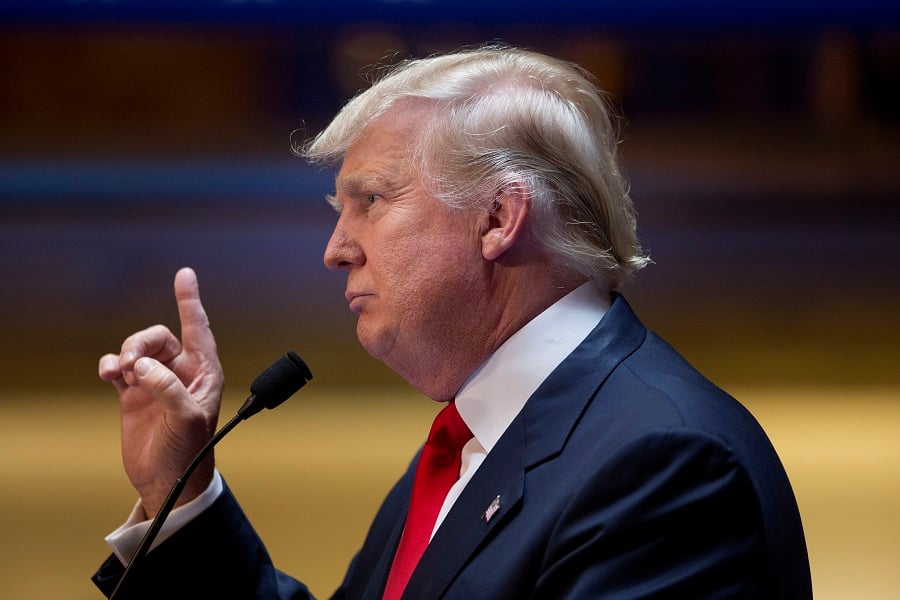For clients who are thinking of rearranging their portfolios in advance of a possible Donald Trump presidency, advisers have quick retort: That's for losers.
Although Mr. Trump is not the odds-on-favorite to beat Democratic front-runner Hillary Clinton in the November election, there has been intense speculation about what a Trump presidency would mean for the U.S. and global economies. And there's almost universal agreement that his policies could spell significant economic changes for the nation. His plan to buy Treasury securities at a discount and repay the debt in eight years, for example, would undermine the U.S.' credit rating and its ability to borrow.
Furthermore, his tax plan,
according to the Tax Policy Center, would generate tax savings for all income brackets and improve incentives to work, save and invest. But it would also reduce federal revenue by $9.5 trillion over 10 years and increase the national debt by 80% of gross domestic product by 2036. Of course, for those who despise the economics of the current administration, a Hillary Clinton presidency seems just as bad.
For advisers, as for many voters, the 2016 election seems fraught with bad choices. So what should an adviser do?
Most advisers say, “nothing,” even though the traditional pop during the election year seems highly unlikely this year. “Even though the S&P 500 posted an average election year price increase of nearly 6% since 1944, the 500 recorded a decline of more than 3% whenever neither candidate was an incumbent,” said
Sam Stovall, U.S. equity strategist for S&P Global Market Intelligence. In addition, contrary to the notion that “gridlock is good,” the S&P 500 scored its biggest annual returns when one party controlled both the executive and legislative branches, Mr. Stovall said.
Financial planner Jonathan Pond, a conservative, is not planning any portfolio changes for his clients based on the election. “Doing so reminds me of people who make investment decisions based on what might happen to the tax laws,” Mr. Pond said. “It's always fraught with risk. Letting your political biases influence your investment management is perilous.”
And, he noted, whatever the outcome of the election, the results will mean that a wealthy New Yorker will be president in 2017. Even though Trump made his fortune in real estate, “I can't imagine Trump being an enemy of Wall Street,” Mr. Pond said. Should the Democrats take control of the Senate, Senator Charles Schumer (D-N.Y.) would become president pro tem of the Senate, and Mr. Schumer is not known as an enemy of Wall Street, either.
Ray Ferrara, a financial planner in Clearwater, Fla., thinks that the nation will survive whoever's elected, and isn't planning on making any changes in his clients' portfolios because of the election. “The economy is bigger than the presidency in and of itself,” Mr. Ferrara said. “The country has had Democrats, Republicans, lawyers, and peanut farmers as presidents, and yet here we are, with the largest, strongest, most well-run economy in the world.”
And thinking that the president can control the economy single-handedly is a mistake, Mr. Ferrara said. “There are really three major ways a president can affect the economy, and all require some level of assistance,” he said. The president can make treaties with foreign nations, but those need to be ratified by the Senate. The president can propose budgets, but those have to be ratified by the House and the Senate. The same is true of any major legislation. “People who think that Trump is going to have a huge effect, other than on the psychological level, well, that's not going to happen,” Mr. Ferrara said.
Peggy Ruhlin, CEO of Budros, Ruhlin & Roe in Columbus, Ohio, said her clients haven't asked for portfolio changes because of the election. “They may have strong feelings about him, both good and bad, but we haven't experienced that,” she said, adding that she worries that people so overwrought about the election might make poor choices, much like those who went entirely to cash in the wake of Y2K computer scare in 2000.
Mr. Trump's statements on foreign affairs and trade could have considerable effect on the value of the U.S. dollar, however. In order, the major trading partners of the U.S. are Canada, China and Mexico, and so far Mr. Trump has managed to offend both China and Mexico. A trade war with either could mean sharply higher import prices. Mr. Trump's threat to deport all illegal aliens would be costly to the government and the economy. His proposal to limit entry to the U.S. by Muslims would prevent the mayor of London from visiting, among other important foreign dignitaries.
David Root, a Philadelphia adviser, is making some changes to his portfolio, primarily because of his worries about the age and health of the current economic recovery, but fears about the election play into that as well. “More so than in recent memory, this year promises to be unpredictable, both leading to the election and post-election,” Mr. Root said. “It's as uncertain as it has been in a long time.”
He's raising cash in his clients' portfolios and increasing bond exposure. In addition, he's reducing international exposure to less than 5% and loading up on large-company,
low-volatility stocks that pay good dividends.
At the moment, however, many advisers are taking a wait-and-see position. “There's an old joke that says that the only things certain in life are death and taxes, but death doesn't get worse when Congress is in session,” Mr. Pond said.
But trying to divine what will happen when someone — even Donald Trump — is elected is a fool's game. “Don't try and second-guess two people who will tell you as little as possible about what they are going to do between now and November," he said.







